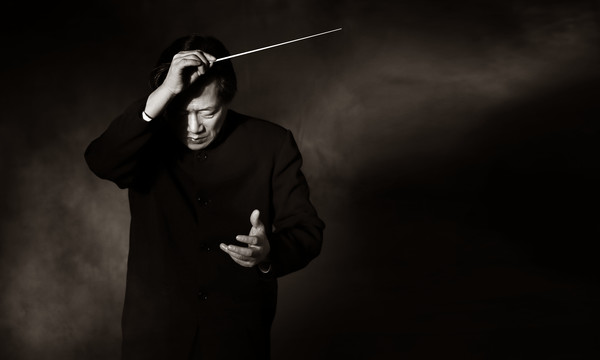
The most important element in animation programs that people could easily remember as children may be the OST that enriches the content. After graduating from Chung-Ang University (CAU) School of Music, Bang Yong Suk composed music for over 300 animation programs, including “Black Rubber Shoes” and “Pokémon”, and he is still popular. Let's find out with CAH about the musician Bang Yong Suk, who is active in all areas of video music, including musicals, TV drama music, and commercial song.
# About CAU
1. Please introduce yourself for CAU students and readers of the Chung-Ang Herald.
Hello. I am Bang Yong Suk, who mainly works in the commercials and animation music, and also works as a professor.
2. At CAU, you majored in classical music among many fields of composition. What is difference between classical music and commercial music?
Most people think commercial music and classical music are completely different genres. They also think commercial music is impure, but classical music is pure. However, as I worked in the commercial music industry, I realized that this was wrong. In other words, there is no difference between them as a genre, but only in their purpose. Therefore, classical music can become commercial music if it is for the purpose of making money.
3. What are your priorities when teaching at a university?
It is the property of commercial music. As mentioned in previous question, it is important to first understand the concept of music used in real life. In Korea, people think classical music is very pure, so it should not be used commercially. Therefore, students should understand that commercial and non-commercial music is not clearly distinguished so that they can make music that is not stereotypical.
# Life as Music Director and Composer
4. How did you feel about the process of making to releasing your first debut work, ‘Mini Cassette Yo-Yo’?
When I first started working in advertising music, I made a lot of practice tracks, but my work did not sell well. At that time, my mentor told me to let go of the theory, but I did not understand that, so I wandered for three years. In fact, my mentor said that I should not confine my emotional expression to the frame of theory. In other words, the theory is just a tool for making a work, and it is important to try and utilize various methods for a work. After realizing this, “Mini Cassette Yo-Yo” came out and became a huge success. So, it is really precious to me.
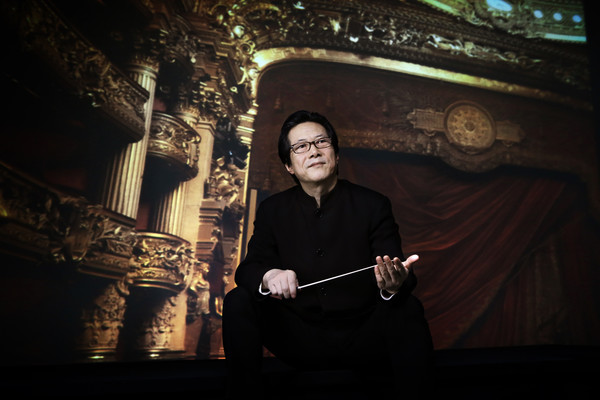
5. In an interview with Maeil Business News in 2003, you said that in order for the Korean animation market to develop, difficulties in creation must be resolved. Now, 20 years later, how your thoughts on the Korean animation market have changed.
I still think that animation companies must solve the difficulties of creation. In order to solve this problem, the most important thing is “authenticity”. Since authenticity is the most important virtue not only in animation but also in all art worlds such as music and dance, when making works, people should do passionately with what they like rather than focusing on a certain purpose.
6. You have been releasing many albums that reorganize existing animation songs in a modern style since 2013. Why?
Children who used to watch animated programs in the past are now in their 20s and 30s. As time passed, the sensibilities of the past and present have changed, but there are still people who are looking for these songs. Because of this, I am rearranging those songs for them. If more time passes and they get old, I will gradually change more songs as well.
7. Which animations gave you hope and fun in your childhood?
Robot Taekwon V and Galaxy Express 999 are the most memorable.
8. The character ‘Bang Yong Suk’ in Black Rubber Shoes is created with you as a motif. The ramen song sung by Bang Yong-seok in the anime is still very popular on social media. Is this episode reflected from your school days?
In fact, the character Bang Yong Suk in Black Rubber Shoes was created without my consent. In progress that director came up with the character, he set me up as a high school student who plays guitar and music and I got to know about him after the fact. However, it is true that the episode reflected my school days. The ramen song inserted in the animation was sung by a voice actor, not me, but the version currently on the market was sung by myself.
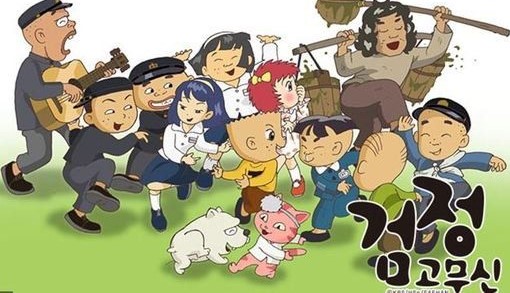
9. You composed the OST for Slam Dunk. In January, 2023, The 1st Slam Dunk was released as a theatrical version and is gaining great popularity. What are your thoughts on this?
In the past, I heard that a famous singer, Park Sang-min, sang the Slam Dunk OST, so I learned about the animation. Therefore, at first, I did not know in detail about the background or contents of Slam Dunk. However, as Slam Dunk's songs became more and more famous, I realized that this basketball-related animation could have a great influence on many people. Because of this, I tried to capture my emotions well when working on the song. Because an animation that went through such a process was released a few decades later and gained a lot of popularity, I was amazed and I realized it is possible that animation could give people this kind of impression once again.
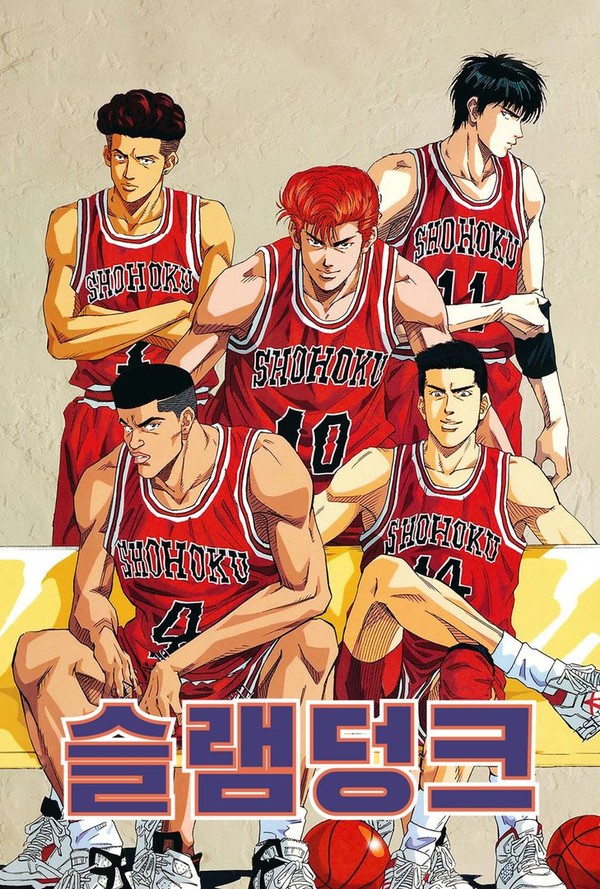
10. When composing animation music, what parts of animation do you get most of your inspiration from?
The storytelling. Because, I think the main point of art is storytelling. Art can be broadly divided into two fields: temporal art and non-temporal art. Temporal arts include music, novels, and dance that directly show the past, present, and future, while non-temporal arts include architecture, sculpture, and painting. However, storytelling is very important in both fields of art. For example, music has one theme and leads to introduction, development, and ending, and even if the art is non-temporal, people see it and organize storytelling by themselves. In other words, all art is storytelling, and I am greatly inspired by it.
11. Among the various animations that you participated in music production, such as Black Rubber Shoes, Digimon Adventure, and Slam Dunk… which is your favorite outside of the music?
Outside of the music, I like Black Rubber Shoes the most. The reason is that the story telling of Black Rubber Shoes shows the times when the director and I were young. Also, the characters are likable. Black Rubber Shoes is humanistic.
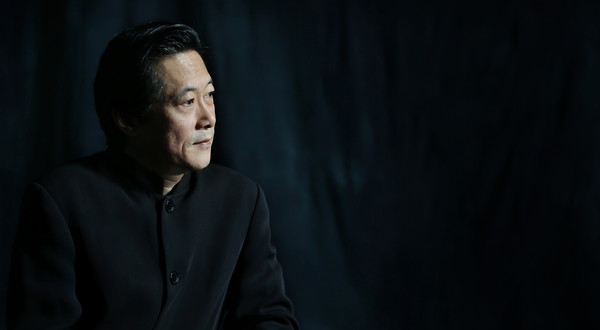
12. The song from animation Run, Hani is so popular, and there are many parodies of it to this day. What do you think about parodying this song in variety shows or dramas?
The reason why I composed the song from Run Hani was that I was originally doing commercial music, but I received a request for this work. The first one was Baby Dinosaur Dooly, and the second one was Run Hani, and I composed a song for Run Hani at the recommendation of my senior. This song became a hit, and it became an opportunity for me to make a lot of animation music. So, when this song appears in variety shows or dramas, I still feel amazed. Also, I think that it is miraculous how I came to compose this song by chance, and after that, how my life has been led by it.
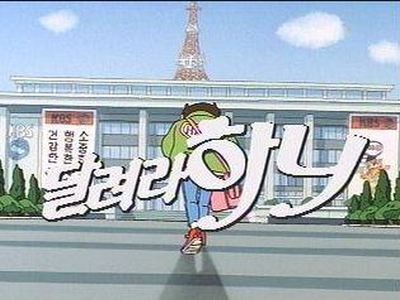
13. You composed various commercial jingles, such as for Coca-Cola, Samyang Ramen, and Cass. There must be many factors to consider as a TV jingle is short. What is the most important factor when composing this kind of song?
The most important factors are attention and memory. Countless advertisements that run for 15 to 20 seconds pass by the audience, so it is most important that making even five or three seconds to remain in people's memories. Also, I try hard to not draw negative images about the advertisement. In other words, attention and memory that include positive images are important.
14. Singers are recruited after the animation song is written. When a singer is recruited for a song made by you, to what extent is your opinion reflected? If it is reflected, is there any part you prefer in the recruiting process.
My opinion is reflected almost 100% unless the production company wants a specific singer. For example, Park Sang-min sang the song for the Slam Dunk animation and Lee Sun-hee sang the song for Run Hani. Other than this, everything is reflected according to my opinion.
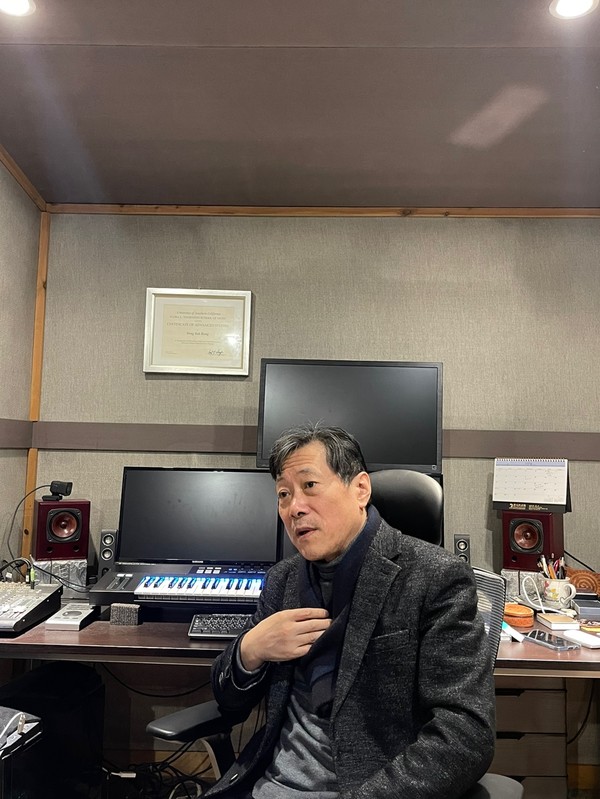
15. Some of the songs that you composed were sung by yourself. Do you have any criteria for selecting the songs you sing yourself?
There are no special criteria for selecting the songs for myself to sing. However, there is one factor to know. Before sending the song to the singer, I sing it in advance and this is called the ‘guide vocal.’ When I listen to the song sang by singer and when I think that my voice will fit better than the actor's voice, I sing it instead.
16. Music made only for commercial purposes is sometimes evaluated as inferior musically. While working as a musician, which one do you put more weight on between commerciality and musicality, and how you harmonize the two.
In general, I think there are a lot of evaluations like this. That's why it's a difficult question to give a clear answer. A bold attempt I made to overcome this dilemma was to introduce classical music into commercial and animation music. Both advertising producers and I are often surprised by the successful results by this attempt. This is because, at first, I also thought that classical music and commercial music were not related at all. However, as time passes and I experience more, there is nothing in the genre itself. I learned that what matters is the purpose of the music. Classical and commercial music are not really separate.
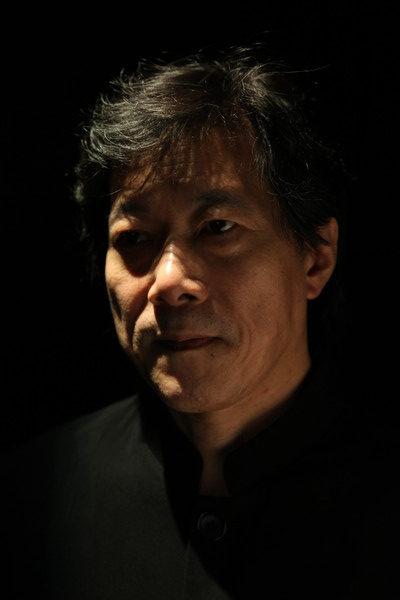
17. You worked with a big focus on commercials and animation music. Do you have any thoughts of composing more music in a new field, such as K-pop?
I like commercial and animation music more than other fields, and I still want to work on them more. Of course, famous composers in the field who are in their 30s right now grew up listening to my music when they were young, so it might have had some influence on their musicality, but I'm satisfied with that. Other fields belong to those who are active in other fields, and I want to create more frames and standards for commercial and animation music.
#Concluding the Interview
18. What kind of influence has CAU had on your life as a musician?
I consider the admission to CAU itself a blessing in my life, and I feel grateful about it. I started my life as a composer after graduating from the College of Music at CAU. And then, CAU is where I work at the end since I have been teaching students here for about 9 years. It has a great meaning in that I am with this place from the beginning to end, and I am especially thankful.
19. Please give your advice and support to CAU students who are working hard towards their dreams.
The biggest commonality of the elites I met is that they are very neatly organized when it comes to their work. If you are not organized about what you are doing, you will not be able to do many things and also you will not be able to achieve great results. Also, as I said before, I want students of CAU to put sincerity into what they do. Rather than just focusing on your school level or grades, find something that excites you and when you put your heart into it, success seems to follow naturally.
Through this interview, CAH was able to learn about the thoughts and goals of musician Bang Yong Suk, who has a deep love for animation. He does not simply look at music from a commercial point of view, but strives to create animation theme songs to help children keep their innocence and nurture their hopes. CAH supports Bang Yong Suk, who will continue to leave behind various songs and have a positive influence on many people.

